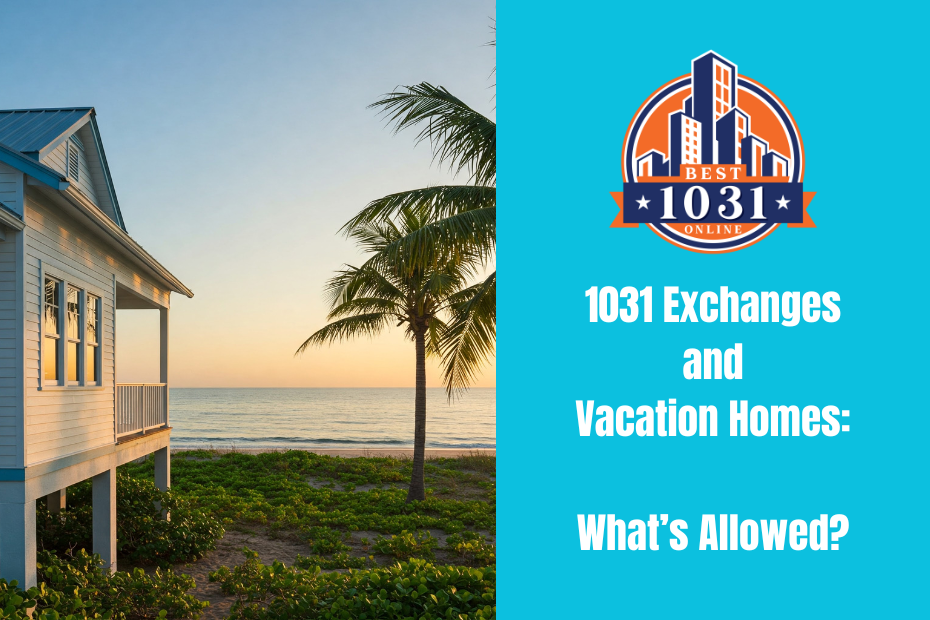One of the more common questions I get —especially from folks who’ve owned their property for years—is: “Can I exchange my house?” Sometimes they’re talking about their personal residence, and other times it’s a second home they occasionally rent out or use during the holidays.
So, let’s set the record straight. If you’re thinking about doing a 1031 Exchange with residential property, here’s what you need to know—and more importantly, what you need to avoid.
Primary Residences vs. Investment Properties – Where the IRS Draws the Line
First, let’s be absolutely clear: your primary residence is not eligible for a 1031 Exchange. Period. Why? Because 1031 is specifically for property held for investment or for productive use in a trade or business—not for personal use. Your home doesn’t qualify because it’s not an investment property. It’s where you live.
However, there’s another tax provision—Section 121—that allows you to exclude up to $250,000 of capital gains (or $500,000 if married) if you’ve lived in the property as your main home for at least two out of the last five years before the sale. So, while you can’t do a 1031 on your primary residence, you might still be able to save big on taxes using Section 121.
Vacation Home Exceptions – When a Second Home Qualifies
This is where things get more nuanced—and interesting. Let’s say you own a vacation home. Maybe a lake house, a ski cabin, or a beach condo. If you use it purely for personal enjoyment, it doesn’t qualify for a 1031.
But if you’ve rented it out and treated it like an investment? Now we’re talking.
The IRS issued Revenue Procedure 2008-16, which laid out a safe harbor rule for vacation homes:
- You must rent the property for at least 14 days per year at fair market rent, and
- Your personal use must not exceed 14 days or 10% of the days rented, whichever is greater.
Do this for two consecutive years prior to the sale, and your vacation home can be considered investment property, making it eligible for a 1031 Exchange.
Converting a Primary Residence – The Investor’s Playbook
Now, if you’ve lived in a home but are now thinking about turning it into a rental for the sake of doing an exchange, you’re not alone. I’ve worked with plenty of clients who’ve used this exact strategy.
Here’s how that works:
- Move out and rent it out—ideally for two full years.
- Keep records showing rental income, depreciation, maintenance costs, and the lease.
- Avoid personal use during that time period.
Once the property has been held for investment, it becomes eligible for a 1031 Exchange. This is a great long-term strategy, especially if you want to sell an appreciated property but defer the capital gains tax hit.
Real-World Examples – How Investors Make This Work
Many investors who own single family rentals want to exchange into a single-family home that is a beach front property that they will ultimately want as their final destination or retirement home. You can do this provided you rent it for the first two years. Once you have two years of showing intent as a rental property, you can move into it and use it as your primary residence. Keep in mind that if you ever decide to sell this property, you will be subject to the capital gains tax that you deferred when you exchanged into it.
One client of mine owned a beachfront home in Ventura. They used it on and off for years but started renting it out more frequently once they retired. After renting it out consistently for two years and keeping personal use under the 14-day rule, we were able to structure a clean 1031 Exchange into a net leased medical office building.
Another client moved out of their old family home, rented it for three years, and then used a 1031 Exchange to roll into a retail strip center. Smart moves. Smart tax planning.
Conclusion – Strategy Wins When It Comes to Residential Exchanges
At the end of the day, the IRS doesn’t care whether you think your property is an investment—they care how you’ve used it. If you want to unlock the power of the 1031 Exchange, your property must be used for investment purposes, and your strategy has to match the rules.
This isn’t something you want to guess on. Before you sell anything, talk to your CPA, your estate planner, and your broker—preferably someone like me who lives and breathes 1031 Exchanges.
Because when done right, a 1031 Exchange can save you hundreds of thousands of dollars in capital gains taxes—and keep your equity compounding for years to come.
We Are Here to Help!
If you are an investment property owner who is interested in a no obligation, private consultation, please visit www.Best1031Online.com, or contact James Bean
of SVN-Rich Investment Real Estate Partners, CA DRE# 01970580, at 805-779-1031
or email at [email protected].
If you are an agent/broker, I am happy to discuss strategies with you on how to best serve your next listing client in preparing them for a successful exchange. Please visit the site and click on the Agent’s button located at the top right-hand corner of the Home Page!
Don’t know what certain terms mean?
Click here for a Glossary of Terms: https://svn-best1031online.com/glossary/
Want more on the 1031 Exchange?
Come join me on my YouTube Channel “Best 1031 Online.”
The ONLY channel 100% dedicated to all things 1031!
And visit CRE Task Wizard at https://cretaskwizard.com/, who supports me in making the channel happen.
Please stay tuned and follow me on LinkedIn, X (formerly known as Twitter), Instagram, & Facebook; @1031BrokerJames.
All information is deemed to be accurate and is not tax or legal advice. All investors/taxpayers should consult their CPA, tax attorney and investment advisors.
